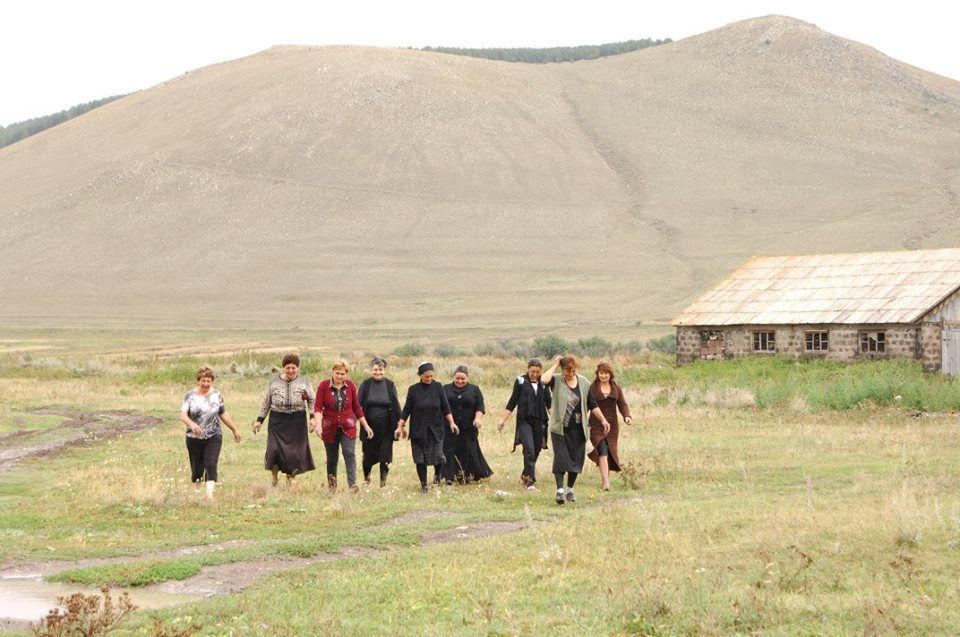
Story about cooperative Khulgumo 2014
ENPARD crew arrived in Akhalkalaki early in the morning but we could not find the family of the head of the cooperative “Khulgumo 2014” at home. They were already in the field and the process of Akhalkalaki potato harvesting for the year of 2016 was on.
The cooperative “Khulgumo 2014” was founded 2 years ago and it unites 20 members from the Armenian ethnic minority group. We were surprised to find out that the cooperative was the most balanced one in terms of gender quantitatively as out of 20, 16 members were women. But this did not turn up to be the only positive characteristic of the cooperative. We were also very pleased to observe the cooperative members’ sensible attitude with regard to cooperation and their visions in terms of business development.
Apetnak Zandaryan is a head of the “Khulgumo” cooperative. He has left his career at the university several years ago and putting aside professor’s qualifications he has embarked into the practical activities in the field of agriculture.
“This is the most beneficial work I could have done for my village and my country”, says Apetnak. “The cooperative members are people who understand that it is impossible to increase production when owning a small land. We believe that unification of resources and common vision is absolutely a must. Each member of our cooperative owns up to 1 hectare of land. All in all we cultivate 10 hectares. All 20 members work equally and make furrows with the same standards, we use the highest quality potato seeds and uniform technology in the process of harvesting and crop storage. There are number of advantages with regards to this approach: costs of production are 4 times cheaper, potato quality is much better, in comparison with the small farming output and the volume of production has also increased by 100%.”
Potato harvest of “Khulgumo” exceeds 50 tons annually and calculation for future is even more promising. 1 year ago with the ENPARD-‘s financial assistance and the technical support of the implementing partner Mercy Corps, the cooperative has received tillage and seeding agricultural machinery, which has further simplified the work of farmers. With the principle of co-financing of the EU grant amounted to 35,000 GEL.
“All members of the cooperative make use of the tractor purchased by the EU without any costs; this affects the net cost of our production and we come up with a very competitive price on the market.“ saysApetnaki. “At the same time we rent the machinery and our clients are other farmers of the region thus the cooperative has additional income source, which will be reinvested in purchasing modern machinery and increase of productivity.”
“Khulgumo” wholesale price of 1 kilogram of potatoe is 40 Tetri. But the problem is not ona production side, the real problem they face is an access to key markets.
“Unfortunately, consumers can not directly connect with farmers, as it is very difficult to obtain a place on the markets. That’s why we have to sell our harvest to resellers, but they enter the markets with the double and triple prices. The farmers as well as consumers are the victims of the situation. If state supports us with the direct access to the markets, we can offer a price of 50-60 Tetri per 1 kg of potato on the market, which will bring financial benefits to the citizens as well as farmers. ” saysApetnaki.
Cooperative members have brought up another important topic during the conversation. Akhalkalaki potato is already a brand, because Javakheti’sfertile, black soil is a source for pesticide-free, healthy products and consumers are well aware of this fact. According to Apetnaki resellers’ engagement in the issue is risky as Georgian consumers can get deprived of choice to buy Akhalkalaki potato. “There are cases when our potato is exported to neighboring countries and our market is flooded by Iranian, Turkish and Egyptian low quality potato which is faked and sold as an Akhalkalaki potato.”
Apetnak has taught us several tricksto distinguish between the imported potatoes from the ones produced in Akhalkalaki.
“At first sight potatoes should not look polished as Akhalkalaki potato always has some black soil left on it. This is number one geographical indicator. I would also recommend to consumers to cut the potato in two halves and take a thorough look at the core of the potato. If there are any red circles observed, this is a sign that potato is high in pesticides. Leave potatoes on the sun for 10-15 minutes and in case they turn red they are not fit for human consumption and if they turn black it means that these potatoes contain starch which is normal and you can eat them without any fear.”
“Khulgumo” has even more far-reaching plans, which is linked to the enlargement of the cooperative. According totheir initial calculations, the volume of the cooperative production should exceed 100 tons.
“I am extremely grateful to the European Union as it does not forget about the farmers in the far South and supports us in the process of contributing in the development of the country through increase in local production. We promise that under the condition of direct access to markets, we will strengthen the country’s economy.”


